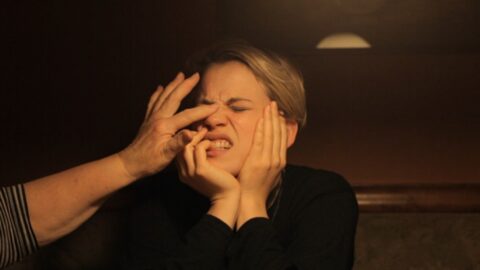Henrike Meyer describes To Be An Extra (2024) as speaking from the future.
Like Zia Anger’s My First Film (2024), Meyer’s film — which also played in the NEXT:WAVE programme — uses the medium of cinema and the act of filmmaking as tools for self-actualisation. Where Anger’s is a fraught, euphoric, collective effort, Meyer’s is internalised, verging on solipsism. Both, however, reveal cinema’s vital role in our lives to merge the past, present and future into one embodied experience.
Meyer’s work as a background actor taught her to be nothing; to be seen but not seen, to be essential but also extraneous. A self in parts, she calls herself. The film’s most interesting segments are the detailed, textured and fragmented examinations of her screen “roles”. The context she gives to the various detectives, cops, nurses, prisoners and partygoers she’s portrayed necessarily involves decontextualising the larger projects to which they contribute, ultimately giving her work a human reality that both requires it and minimises it.
To Be An Extra attempts to turn Meyer, seemingly lost in her own life as she approaches 40, back into a flesh-and-blood person, not a collection of pixels. Her journey of self-realisation is made up mostly of conversations with family members and other background players in her own life.
But watching someone sit and absorb advice doesn’t make for particularly compelling cinema. What is most interesting is actually what she takes in by herself, like the curiously impersonal but deliberately visceral connections with the ASMR YouTubers she watches while she falls asleep. We hear one thank his subscribers for donating money to his channel which, he says, is on the verge of folding because of other commitments. The digital world, where Meyer feels she’s become lost through her acting, perhaps offers more solace than she realises.
Chris is an American freelance film programmer, writer, and critic based in London. He fills the rest of his time working in film distribution.





